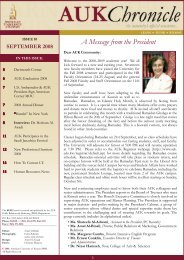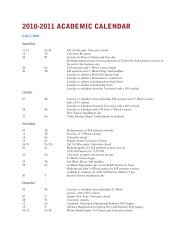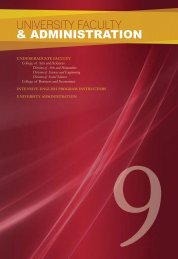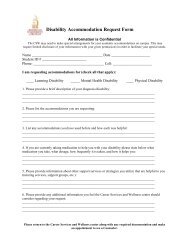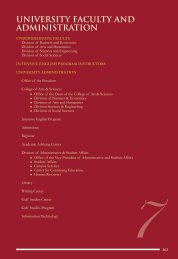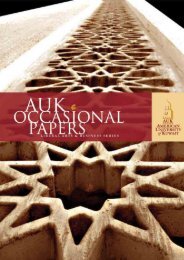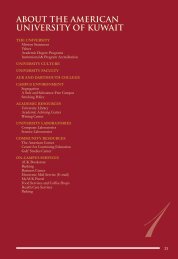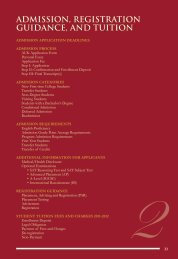other in the pursuit of higher grades. As one student putit in a conversation, referring to her cool relations withher fellow female classmates, “They don’t like me becauseI don’t help them cheat.”By contrast, the four items most frequently rankedbelow average include: administration/registration(62%), sports (56%), extra-curricular activities (49%) andstudent advising (46%). The main feedback concernsregistration activities and its personnel. (Low rankingsfor sports, extracurricular activities and student advisingreflect their absence; this point is revisited under studentrecommendations.) Some students felt that certainstudents receive preferential treatment owing to wasta thatis used on their behalf. Among the identified forms ofpreferential treatment attributed to wasta were: registrationafter the add/drop period has closed, access to classeswhen registration has closed, choice of instructor, removalof attendance warnings, matriculation with low GPAs andgrade changes. It is important to clarify that whether thissituation actually exists, the perception is that it does. In onestudent’s assessment:I think wasta does exist…, but truthfully I haven’t seen it first hand,but it is obvious with some of the students and the (privileges)they have, especially with the registration department.The presence of wasta, defined in the survey as gettingillegal or illicit favors through connections, is ranked asbeing high or very high by 46% among those surveyed. Itis noteworthy that over twice as many students identifiedwasta issues with registration (35%) as compared tofaculty (15%) in the survey comments. Some commentsabout faculty mention instructors exchanging grades forservices or being influenced by wasta. One student aptlysummarized the concern in the following:Wasta exists everywhere not only at (this university), butthe question (is) why is it at (this university) …and itprovides an education. All students should be equal…only their grades and hard (work) should determine whatthey should get…At the end, survey respondents were asked: If you wereappointed to improve anything you want at (this university) whatwould you do? Responses were categorized by subject. Themain suggestions for administration and registration,courses, policies, faculty and students that emerged are:• Improving registration procedures and upgrade theirstaff qualifications.• Offering more courses with greater section availability.• Implementing grade policies ensuring fairness.• Integrating classes for males and females.• Employing more and better qualified faculty.• Demonstrating greater concern and fairness towardstudent educational needs.Given the students’ perception that wasta exists as anunofficial practice and that it influences grade assignments,students are reinforced into viewing grades as negotiablecommodities instead of benchmarks for achievement. Asthe student profile emerging from the survey suggests,there are more incentives to negotiate grades if the studenthas extensive time in school, a faltering GPA, a low coursecompletion rate and there is limited oversight of studentprogress and needs by counselors and advisors.By the same token, it is also easier for student counselorsand instructors to become remiss in their obligationsas standard bearers for quality work in learning. Eveninexperienced ones soon come to realize that they willbe besieged by students (if not their wasta intercessors),seeking to negotiate grades if their charges are not passingat acceptable levels. It becomes expedient to devisegrading schemes that permit the largest number to passor overlook plagiarized content in papers. As one studentnotes about grading: “If the professor is mostly afraid ofthe position of the student’s background he will let himpass and even with good grade. Not all professors do this,but there are existing professors who really use ‘wasta’.”(Spelling and grammatical errors kept for emphasis.)This study and the literature seem to suggest that wastathrives where accountability is lacking; lines of authorityare unclear; and there is no organizational learning. Amongfirst impressions of newcomers to this university is thatthere are no institutionalized procedures (partly becauseby-laws and written rules are inaccessible); decisionmakingand planning processes are not transparent;and communication is inadequate. In sum, wasta issymptomatic of an organization whose existing rules arebeing un-enforced and structures that are being by-passed.Wasta is, as one student put it, the “back door” to gettingthings done. It continues because whatever formal alternativesare not functioning for the student, faculty or the university.What goes un-remarked is that while intercessory wastamay solve the individual problems of today for a few, itcomes at the price of organizational gains at this privateGulf University and others for the many, tomorrow.29
307.0 DiscussionThe survival of liberal education institutions in conservativesocieties will depend largely on the flexibility of the variousparties involved to find some common middle ground.Potential solutions to the problems associated withestablishing liberal education can be categorized alongintra-organizational and extra-organizational lines. Inboth instances, decision-makers will need to be insulated,especially at higher levels, from the negative practicesassociated with wasta (e.g. favoritism, cronyism, etc.).Similarly, professionalism and transparency in practiceswill need to be strengthened.At the intra-organizational level, the task is to create alearning organization that can respond effectively and in atimely manner to challenges. Adoption of the followingmeasures should be given serious consideration:(i) Employing more early warning mechanisms to advisestudents of their situation and transform relationswith wasta intercessors that become guarantors ofperformance instead of purveyors of influence.(ii) Promoting critical thinking both in the classroomand in the boardroom. Critical thinking challengesthe irrationalities in hiring and promotion ofprofessionals, admission of students, and other facetsof university operations that arise under currentwasta practices.(iii) Improving teaching methods and encouraging innovationin the classroom.(iv)Fostering loyalty to the organization by providingbenefits and long term employment guarantees basedon performance outcomes (e.g. quality teaching,publications, and contributions to the university’smission).(v) Democratizing the decision-making process forinternal operation of private universities through theinsertion of faculty and administrative representation onuniversity governance boards. This includes consultingfaculty members about academic standards and thehiring or firing in their departments. Additionally,students need to be consulted on issues pertaining toacademic curricula.(vi) Examining means to encourage diversity within thestudent population in Gulf universities.At the extra-organizational level, attention needs to begiven to creating more backward and forwards linkagesthat are involved in the quality assurance process. Whereappropriate, the means to attain this end could involve:(i) Creation of private university councils at the regionalnot just country levels.(ii) Development of new national curricula standards foruniversities and high schools.(iii)Establishment of national entrance and exit examsfor universities and high schools.(iv) Review and stricter enforcement of teacher andadministrator credential standards.(v) Increased feedback and cooperation with regionaland local employers through councils, practicums andother means to ensure that local education is meetinglabor market needs including program specializationamong different schools in the region to removeunneeded duplication of programs.The above proposed suggestions aside for a moment, thetouchstone to any proposed solution resides in renderingan organizational structure that enables private universitiesto both function effectively and compete efficiently.Transforming intercessory wasta is key to promotingboth academic quality and competitiveness. Takingsteps to democratize the institution will help addressorganizational learning needs and pre-empt some of theworst of the potential organizational ills that could besetwestern style liberal educational institutions in the future.This process begins with improving communicationamong all concerned and involving faculty in the majordecisions, at a minimum.In the longer run, observers believe that higher academicstandards will enable Gulf universities to attract betterqualified professional faculty, administration and bettermotivated students with higher academic standards andachievements. Conversely, lowering the academic barwill cause these universities to be magnets for poorerperforming student affecting a change in the institutions,themselves, where they function like diploma millscranking out degrees with limited employment prospects.As this paper has attempted to demonstrate, the promotionof quality education and the maintenance of intercessorywasta under current arrangements are intrinsicallycontradictory and each carries a steep price tag. While thereare still prices to pay, metaphorically speaking, it mightjust be possible to employ wasta in the service of westernliberal education’s aims if adequate attention is paid to thecontext that wasta operates in. If the wasta intercessorbecomes the guarantor of student performance outcomesearly on and organizational learning is fostered in thecontext of a system of backward and forward linkages
- Page 2 and 3: About AUK Occasional Papers:The AUK
- Page 4 and 5: higher education is distinguished b
- Page 6 and 7: The Impact of a Glass Ceilingon Wom
- Page 8 and 9: more women a chance to flourish in
- Page 10 and 11: consider other factors such as the
- Page 12 and 13: academically unprepared…you must
- Page 14 and 15: EmotionalSignificant variations in
- Page 16 and 17: Advising and OrientationOther impor
- Page 18 and 19: etention. However, in addition, the
- Page 20 and 21: Hadi and Llabre (1998) assessed int
- Page 22 and 23: the event was encoded in parallel a
- Page 24 and 25: Public Health Impacts of Iraq’s 1
- Page 26 and 27: college work and have inadequate pr
- Page 28 and 29: memorization and repetition. This a
- Page 32 and 33: for quality assurance, an organizat
- Page 34 and 35: RethinkingEntrepreneurship:Integrat
- Page 36 and 37: This type of training leads to enha
- Page 38 and 39: In short, Mount Allison students ha
- Page 40 and 41: Joplin, L. (1995). On defining expe
- Page 42 and 43: Figure 1. ExperientialEntrepreneurs
- Page 44 and 45: Kuwait - satellite television, cult
- Page 46 and 47: ReferencesAbt, V. & Seesholtz, M. (
- Page 48 and 49: interest in continuing to manipulat
- Page 50 and 51: Though corruption poses fundamental
- Page 52 and 53: A Cross-Cultural Modelof Innovation
- Page 54 and 55: were conceived as associations of c
- Page 56: others. In this case, confident pos
- Page 59 and 60: 58REFERENCESAmason, A. (1996) ‘Di
- Page 61 and 62: Shelton, C. and Darling, J. (2004)
- Page 63 and 64: 62• recycle natural resources use
- Page 65 and 66: 64Table Kuwait Fact Profile on Tran
- Page 67 and 68: Table Transportation and Associated
- Page 69 and 70: 68• Third, each mode of transport
- Page 71 and 72: 70• Prepare a Bank Group transpor
- Page 73 and 74: 7219. Stratford,A. (1974). Airports
- Page 75 and 76: 74may be developed in a safe and or
- Page 77 and 78: 28. Tables - 1 Environmental Manage
- Page 79 and 80: 6) EnvironmentalAwarenessNo baselin
- Page 81 and 82:
80Iran, the US, and HighlyEnriched
- Page 83 and 84:
82since the 1951 nationalization of
- Page 85 and 86:
8450% of the population is astonish
- Page 87 and 88:
86The US also approved the Shah’s
- Page 89 and 90:
88George W. Bush’s State of the U
- Page 91 and 92:
90when Iran could not keep up with
- Page 93 and 94:
92rich states, the decrease of natu
- Page 95 and 96:
94indigenous training. Specifically
- Page 97 and 98:
96It is important to note that Russ
- Page 99 and 100:
Table 1: Nuclear Powered States and
- Page 101 and 102:
100Foucault, Michel. “What are th
- Page 103 and 104:
102Ramazani, Rouhollah K. “Iran
- Page 105 and 106:
104My SCORE, OurMATCH: CommunityPar
- Page 107 and 108:
106with a mate while he does mechan
- Page 109 and 110:
108dimensions of life including for
- Page 111 and 112:
correlated to the commitment and on
- Page 113 and 114:
REFERENCESBryce, J, Frigo, T, McKen
- Page 115 and 116:
GDP $21,300, GDP growth rate 6.8%,
- Page 117 and 118:
• Less than half of the people su
- Page 119 and 120:
118TABLE 4: # 1 Gulf Country in Eco
- Page 121 and 122:
120• More men than women indicate
- Page 123 and 124:
TABLE 8: Why? X GenderGENDERMALE FE
- Page 125 and 126:
TABLE 11: Success in improving Livi
- Page 127 and 128:
TABLE 14: Success in preserving Cul
- Page 129 and 130:
• Gender wise, more men felt that
- Page 131 and 132:
TABLE 18: How foreign workers are t
- Page 133 and 134:
• In terms of the preference of e
- Page 135 and 136:
TABLE 24: Should Oil be the Basis f
- Page 137 and 138:
F i gur e 18: S hould K uwa it J oi
- Page 139 and 140:
13811. What do you think about the
- Page 141 and 142:
140Conditions of Kuwaiti Dependence
- Page 143 and 144:
1422) if the alien has no means of
- Page 145 and 146:
144offered Mubarak recognition as a
- Page 147 and 148:
146labor regulations and enforcemen
- Page 149 and 150:
148intensifying suspicion and hosti
- Page 151 and 152:
150Commission on Freedom of the Pre
- Page 153 and 154:
Even the viceroy of India, Lord Cur
- Page 155:
Christine PiconeAustralian College



